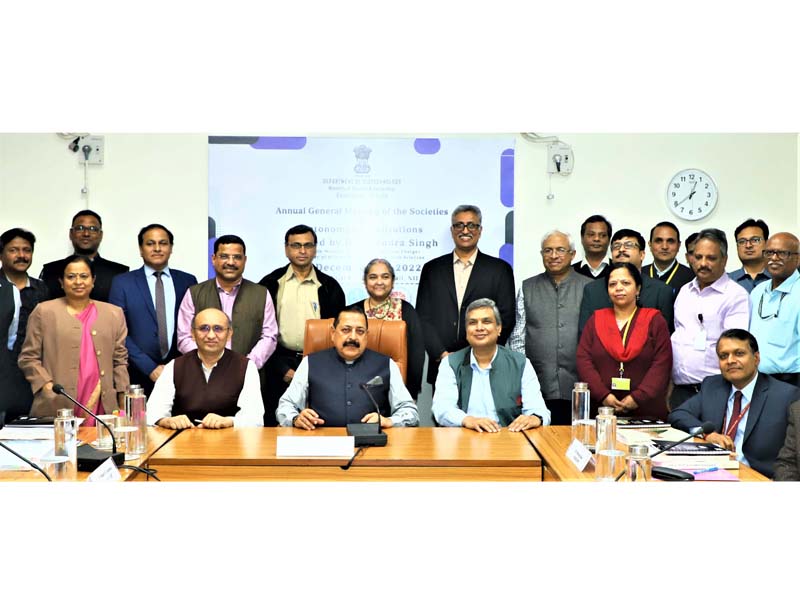
Excelsior Correspondent
NEW DELHI, Dec 2: Union Minister of State (Independent Charge) Science & Technology; Minister of State (Independent Charge) Earth Sciences; MoS PMO, Personnel, Public Grievances, Pensions, Atomic Energy and Space, Dr Jitendra Singh today called for enhancing StartUp outreach and incentivising research as well as Inter and Intra collaboration among the frontier Biotechnology Institutes of the country for cutting-edge and translation research for overall benefit of society.
Speaking after two-day comprehensive review of 14 Autonomous Institutions of the Department of Biotechnology at National Institute of Immunology, Dr Jitendra Singh gave the mantra of “Strive for Excellence & Innovate for the Future” to all the 14 institutes.
Dr Jitendra Singh said, in an era of rapid innovations and transformative changes, Biotech Institutes should focus on its core competency and strive hard to bring research and product development at par with global standards. He said, though National Institute of Immunology (NII) has been pioneering in deciphering the molecular basis and host response to infectious diseases like tuberculosis, malaria and viral diseases including Dengue and COVID, but its recent breakthrough in evaluating the intranasal Covid-19 vaccine in phase 3 clinical trial for its immunological effectiveness is noted by all.
Dr Jitendra Singh pointed out that DBT-National Agri Food Biotechnology Institute (NABI), Mohali identifies priority cereal and fruit crops with focused traits to implement genome editing approaches. He said, these new initiatives will be co-developed along with industries to streamline its operations and thereby providing impetus to Indian agriculture.
Similarly, Translational Health Science and Technology Institute (THSTI), Faridabad has a strong mother and child health research program. Its research on immediate Kangaroo mother care has resulted in a new recommendation by WHO for preterm babies. THSTI is developing therapeutic molecules against tuberculosis, dengue and non-alcoholic fatty liver disease. It has contributed to covid-19 vaccine and is currently developing a pan beta coronavirus vaccine, the Minister added.
Dr Jitendra Singh informed that Rajiv Gandhi Centre for Biotechnology (RGCB)’s HPV vaccine efficacy studies of 10 years have resulted in establishing a single dose of HPV vaccine for 9 to 18 years old children sufficient to prevent infection. RGCB is also doing vaccine efficacy studies for the first indigenously developed HPV vaccine and the above has now been adopted by WHO for immunisation strategy.
The achievements of National institute of animal biotechnology, (NIAB) Hyderabad has been underlined for the development of LSDV vaccine candidates through immunoinformatics, first report on complete genome sequence of LSDV (Andhra isolate), Electrochemical based Lateral Flow Assay for Japanese Encephalitis Virus and Toxoplasma Gondai.
Dr Jitendra Singh was given presentation by Institute for Stem Cell Science and Regenerative Medicine (inStem) in Bengaluru as the institute is carrying out cutting edge research using stem cells to understand blood and cardiovascular diseases and brain disorders.
Director of the National Institute of Biomedical Genomics (NIBMG) has informed the Minister that they have identified the genomic changes which mark transition from precancer to frank oral cancer. They have conducted the first genome wide study in the GARBH-Ini cohort to identify genomic and epigenomic markers of preterm birth and also spearheaded the Indian SARS-CoV-2 Genomics Consortium, INSACOG, which provided valuable information on the emergence and spread of viral variants for public health management during the pandemic.

